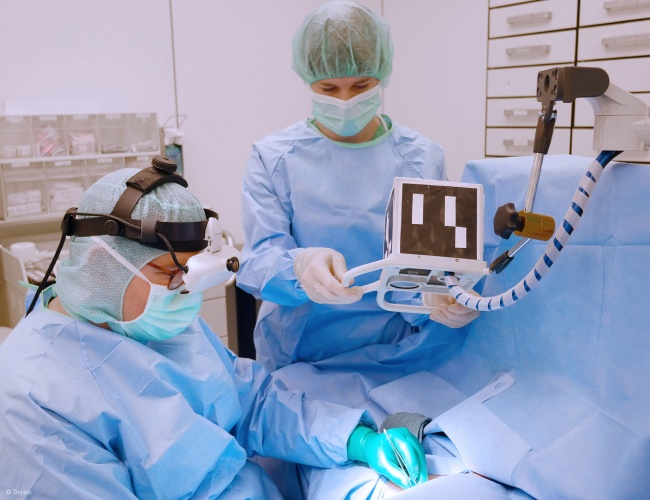Augmented reality system helps surgeons tackle tumours
A new augmented reality (AR) system developed at Germany’s Fraunhofer Institute is enabling surgeons to precisely identify the location of lymph nodes and remove cancerous tissue.

(Credit: Fraunhofer Institute)
3D-ARILE uses a combination of hardware and software to assist in the removal of sentinel lymph nodes, important for the treatment of certain types of cancer such as skin, breast and prostate. An indocyanine green (ICG) fluorescent dye is first injected in the vicinity of the tumour, which is then exposed to infrared LEDs. A near infrared (NIR) camera captures the resulting fluorescence and produces a 3D reconstruction of the affected lymph nodes. This virtual image is then displayed to the surgeon in real time via a pair of AR glasses.
“To make the affected lymph nodes visible, the fluorescent dye is injected into the patient in the direct vicinity of the primary tumour. It then spreads along the lymphatic pathways and collects in the sentinel lymph nodes,” explained Fraunhofer research scientist Dr Stefan Wesarg.
“In our case, the malignant tissue is marked in green. In this way, the surgeon can verify that every last trace has been removed.”
Register now to continue reading
Thanks for visiting The Engineer. You’ve now reached your monthly limit of news stories. Register for free to unlock unlimited access to all of our news coverage, as well as premium content including opinion, in-depth features and special reports.
Benefits of registering
-
In-depth insights and coverage of key emerging trends
-
Unrestricted access to special reports throughout the year
-
Daily technology news delivered straight to your inbox










Water Sector Talent Exodus Could Cripple The Sector
Maybe if things are essential for the running of a country and we want to pay a fair price we should be running these utilities on a not for profit...